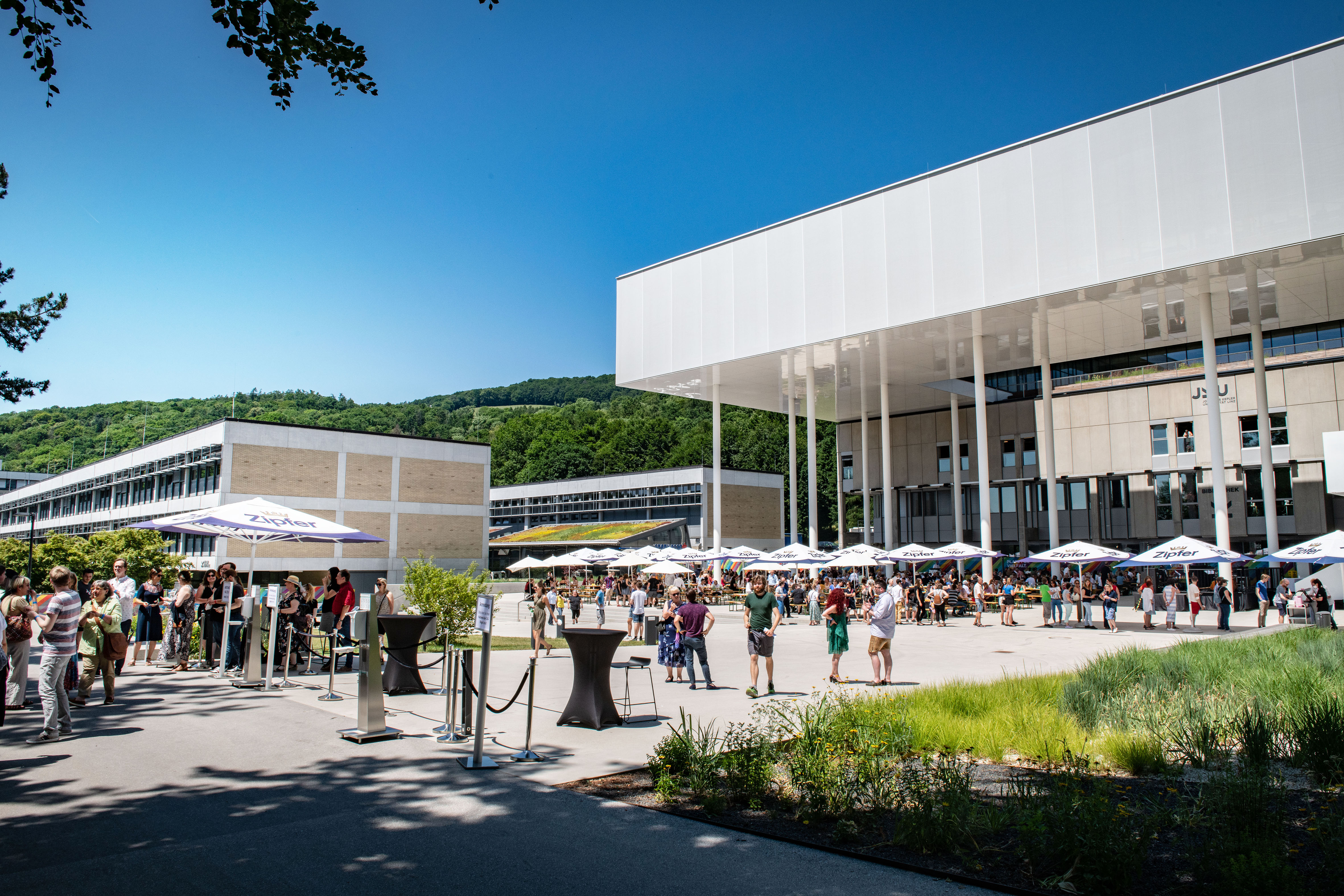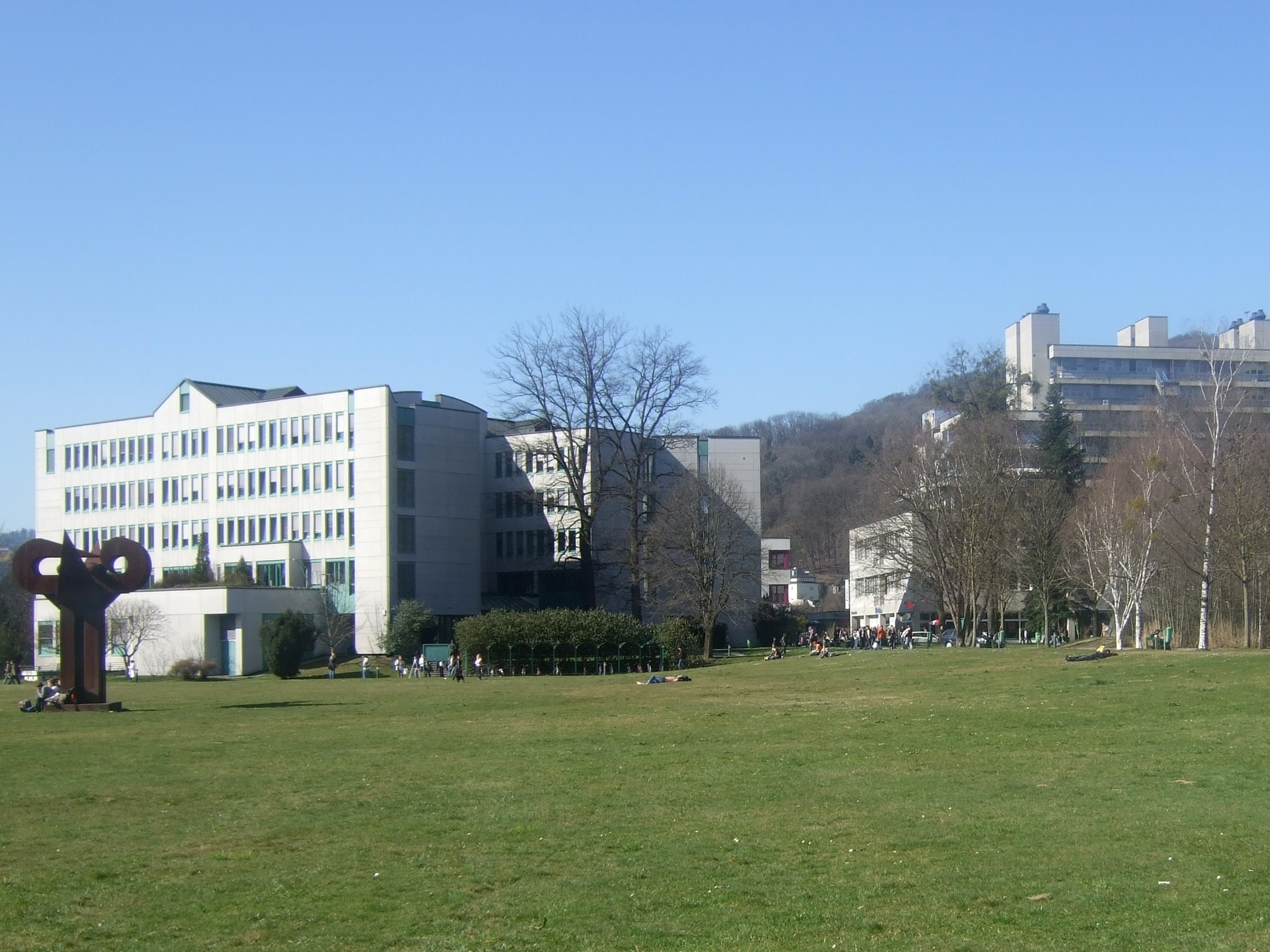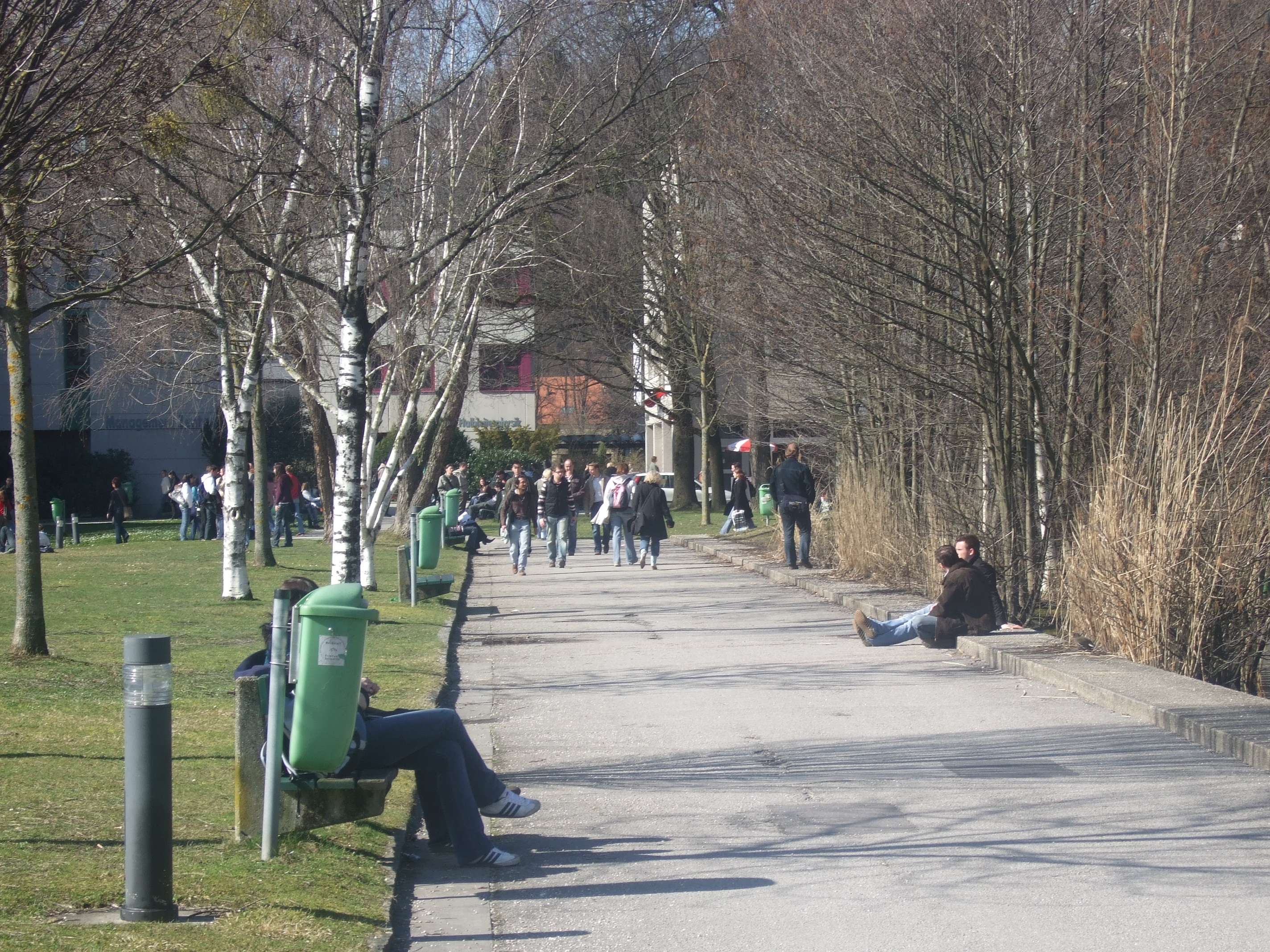Johannes Kepler University on:
[Wikipedia]
[Google]
[Amazon]




 The Johannes Kepler University Linz (German: ''Johannes Kepler Universität Linz'', short: ''JKU'') is a public institution of higher education in
The Johannes Kepler University Linz (German: ''Johannes Kepler Universität Linz'', short: ''JKU'') is a public institution of higher education in
Official JKU website
Information for prospective international students
(in English)
(in English)
Julius Raab Heim
WIST Haus
Kepler Heim
Evangelisches Studentenheim Linz (esh)
Katholische Hochschulgemeinde Linz (KHG)
Hotel Sommerhaus (Julius Raab Heim)
Johann Radon Institute for Computational and Applied Mathematics
(in English)
{{authority control Educational institutions established in 1966 Buildings and structures in Linz Johannes Kepler Education in Upper Austria 1966 establishments in Austria




 The Johannes Kepler University Linz (German: ''Johannes Kepler Universität Linz'', short: ''JKU'') is a public institution of higher education in
The Johannes Kepler University Linz (German: ''Johannes Kepler Universität Linz'', short: ''JKU'') is a public institution of higher education in Austria
Austria, , bar, Östareich officially the Republic of Austria, is a country in the southern part of Central Europe, lying in the Eastern Alps. It is a federation of nine states, one of which is the capital, Vienna, the most populous ...
. It is located in Linz
Linz ( , ; cs, Linec) is the capital of Upper Austria and third-largest city in Austria. In the north of the country, it is on the Danube south of the Czech border. In 2018, the population was 204,846.
In 2009, it was a European Capital of ...
, the capital of Upper Austria
Upper Austria (german: Oberösterreich ; bar, Obaöstareich) is one of the nine states or of Austria. Its capital is Linz. Upper Austria borders Germany and the Czech Republic, as well as the other Austrian states of Lower Austria, Styria, a ...
. It offers bachelor's, master's, diploma and doctoral degrees in business, engineering, law, science, social sciences and medicine.
Today, 19,930 students study at the park campus in the northeast of Linz, with one out of nine students being from abroad. The university was the first in Austria to introduce an electronic student ID in 1998.
The university is the home of the Johann Radon Institute for Computational and Applied Mathematics (RICAM) of the Austrian Academy of Sciences.
In 2012, the Times Higher Education ranked the JKU at # 41 and in 2015 at # 87 in its list of the top 100 universities under 50 years old. According to the 2012 ranking, the JKU was the fifth best young university in German-speaking Europe. The university attained high scores for quotations, third-party funding, and internationalization efforts.
History
The JKU was established as the "College of Social Sciences, Economics and Business" (''Hochschule für Sozial- und Wirtschaftswissenschaften'') in 1966. The Faculty of Sciences and Engineering was established three years later and in 1975, the college was awarded university status and the Faculty of Law was integrated on campus. The university was named in honor of astronomerJohannes Kepler
Johannes Kepler (; ; 27 December 1571 – 15 November 1630) was a German astronomer, mathematician, astrologer, natural philosopher and writer on music. He is a key figure in the 17th-century Scientific Revolution, best known for his laws ...
(1571-1630) who wrote his magnum opus ''harmonices mundi'' ("The Harmony of the world") in Linz during the early 17th century and taught mathematics at a school for the landed gentry (''Adelichen Landt-Schuelen'') near Linz. At present, the campus added the "JKU Science Park", additional buildings for science and engineering institutes. In 2019 many new buildings are being built.
Campus
JKU's campus is located in the northeast ofLinz
Linz ( , ; cs, Linec) is the capital of Upper Austria and third-largest city in Austria. In the north of the country, it is on the Danube south of the Czech border. In 2018, the population was 204,846.
In 2009, it was a European Capital of ...
, in the ''Auhof'' area of the ''St. Magdalena'' district. The university buildings are placed in a 90-acre (364,000 m²) park centered around a pond.
Infrastructure
The campus is accessible by theLinz tram
Trams in Linz (german: Linzer Straßenbahn-Netz) is a network of tramways forming the backbone of the urban public transport system in Linz, which is the capital city of the States of Austria, federal state of Upper Austria in Austria.
The networ ...
lines ''1'' and ''2'' and the express bus line ''77''. On weekdays, trams travel every 5 minutes and a trip to the city center (''Hauptplatz'') takes approximately 16 minutes.
The JKU is also located close to Austria's autobahn
The (; German plural ) is the federal controlled-access highway system in Germany. The official German term is (abbreviated ''BAB''), which translates as 'federal motorway'. The literal meaning of the word is 'Federal Auto(mobile) Track'. ...
network at the''Dornach'' exit on the ''A7 Mühlkreisautobahn'' (ca. 1 km or 0.6 miles). In anticipation of extending the campus, an additional autobahn exit, ''Auhof'', is currently in the construction stages and is expected to better facilitate traffic, allowing a more direct route to the university.
A bicycle path in the north-east corner of the town located along the north side of the Danube
The Danube ( ; ) is a river that was once a long-standing frontier of the Roman Empire and today connects 10 European countries, running through their territories or being a border. Originating in Germany, the Danube flows southeast for , pa ...
river provides direct access to the university and helps to reduce traffic in the area.
Housing
Many larger dormitories are within walking distance of the university, such as the ''Julius Raab Heim'', the ''WIST Haus'', the ''Kepler Heim'', the ''ESH'' and the ''KHG Heim''. Several other dormitories are located in different parts of Linz, providing housing for more than 3,100 students in all of Linz. Some of the dormitories becomehotel
A hotel is an establishment that provides paid lodging on a short-term basis. Facilities provided inside a hotel room may range from a modest-quality mattress in a small room to large suites with bigger, higher-quality beds, a dresser, a ref ...
s during the summer holidays, most notably the ''Julius Raab Heim'' under the name ''Hotel Sommerhaus''.
Organization
Management
The university Rector and Academic Senate are responsible for the university's management. There are several vice rectors who are each assigned to specific task areas and who assist the Rector. The university board is an independent body that advises and counsels the Rector and Academic Senate on management issues. Deans and faculty committees are responsible for management on a faculty level. Rector and deans are elected for a 4-year period whereas faculty committees are elected for a 2-year period.Faculties and Degree Programs
The Johannes Kepler University has four faculties with a total of 127 institutes.Faculty of Social Sciences, Economics and Business (SoWi)
The Faculty of Social Sciences, Economics and Business is the oldest and largest faculty in terms of students and graduates. The faculty consists of 32 institutes and offers academic degrees e.g. in Economics and Business Administration, Business Informatics, Business and Education,Social Economics
Socioeconomics (also known as social economics) is the social science that studies how economic activity affects and is shaped by social processes. In general it analyzes how modern societies progress, stagnate, or regress because of their local ...
, Sociology
Sociology is a social science that focuses on society, human social behavior, patterns of Interpersonal ties, social relationships, social interaction, and aspects of culture associated with everyday life. It uses various methods of Empirical ...
and Statistics
Statistics (from German language, German: ''wikt:Statistik#German, Statistik'', "description of a State (polity), state, a country") is the discipline that concerns the collection, organization, analysis, interpretation, and presentation of ...
.
The faculty's abbreviation ''SoWi'' is derived from the German name of the faculty, ''Sozial- und Wirtschaftswissenschaftliche Fakultät''.
Faculty of Engineering and Natural Sciences (TN)
The Faculty of Engineering and Natural Sciences was established in 1969 and initially offered degrees e.g. in Technical Mathematics,Computer Science
Computer science is the study of computation, automation, and information. Computer science spans theoretical disciplines (such as algorithms, theory of computation, information theory, and automation) to Applied science, practical discipli ...
and Technical Physics. Over time, degrees in Technical Chemistry, Mechatronics
Mechatronics engineering also called mechatronics, is an interdisciplinary branch of engineering that focuses on the integration of mechanical, electrical and electronic engineering systems, and also includes a combination of robotics, electronics, ...
and Information Electronics were introduced.
Several master's degrees to specialize in the area of computer science, mathematics and physics, such as pervasive computing
Ubiquitous computing (or "ubicomp") is a concept in software engineering, hardware engineering and computer science where computing is made to appear anytime and everywhere. In contrast to desktop computing, ubiquitous computing can occur using ...
, industrial mathematics
Applied mathematics is the application of mathematical methods by different fields such as physics, engineering, medicine, biology, finance, business, computer science, and industry. Thus, applied mathematics is a combination of mathematical ...
or biophysics
Biophysics is an interdisciplinary science that applies approaches and methods traditionally used in physics to study biological phenomena. Biophysics covers all scales of biological organization, from molecular to organismic and populations. ...
are available. Doctorate degrees are offered in the areas of natural science
Natural science is one of the branches of science concerned with the description, understanding and prediction of natural phenomena, based on empirical evidence from observation and experimentation. Mechanisms such as peer review and repeatab ...
and technical science.
The TN faculty consists of 51 distinctive institutes and the German name is ''Technisch-Naturwissenschaftliche Fakultät'', hence the abbreviation ''TN'' or ''TNF''.
Faculty of Law (RE)
The Faculty of Law was officially established in 1975. Before that time period, law degrees were offered by the ''SoWi'' faculty, which was then the''Faculty of Social Sciences, Economics, Business and Law''. In addition to Diploma and doctorate degrees in law, the RE faculty offers a Bachelor's degree in Business Law in cooperation with the ''SoWi'' faculty. Law degrees are also offered via multimedia distance learning. The abbreviation ''RE'' is derived from the first two letters of the faculty's name German name, ''Rechtswissenschaftliche Fakultät.'' At present, the RE faculty consists of 20 institutes.Faculty of Medicine (MED)
The Faculty of Medicine was founded in 2014. A new MED-Campus is being built.Interdisciplinary programs
The master's degree program in web sciences is divided into branches of study:social web
The social web is a set of social relations that link people through the World Wide Web. The social web encompasses how websites and software are designed and developed in order to support and foster social interaction. These online social inte ...
, web art & design, web business & economy, web engineering
The World Wide Web has become a major delivery platform for a variety of complex and sophisticated enterprise applications in several domains. In addition to their inherent multifaceted functionality, these Web applications exhibit complex behavio ...
as well as
web and the law. It offers those with academic background in various fields a research-led expansion and in-depth look at fields relevant to the web such as technology, business, law, society, art and culture.
Distance learning
The JKU maintains several distance learning centers in Austria that offer degrees and courses at the GermanFernUniversität Hagen
The University of Hagen (german: link=no, FernUniversität in Hagen, informally often referred to as FU Hagen) is a public research university that is primarily focused on distance teaching. While its main campus is located in Hagen, North Rh ...
, the British Open University
The Open University (OU) is a British public research university and the largest university in the United Kingdom by number of students. The majority of the OU's undergraduate students are based in the United Kingdom and principally study off- ...
and JKU's own distance law degree program.
Other universities in Linz
There are three other universities in Linz: TheUniversity of Art and Design Linz
The University of Art and Design Linz (common short form University of Arts Linz) is one of four universities in Linz, Upper Austria
Upper Austria (german: Oberösterreich ; bar, Obaöstareich) is one of the nine states or of Austria. Its ca ...
, a public university for arts and industrial design (ca. 800 students), the Anton Bruckner Private University
The Anton Bruckner Private University (in German ''Anton Bruckner Privatuniversität'', common short form is ''Bruckner University'') is one of five Austrian Universities for Music, Drama and Dance, and one of four universities in Linz, the Euro ...
with approx. 1000 students enrolled, and the Catholic Private University Linz
The Catholic Private University Linz is one of four universities in Linz, the capital of Upper Austria
Upper Austria (german: Oberösterreich ; bar, Obaöstareich) is one of the nine states or of Austria. Its capital is Linz. Upper Austria ...
with about 500 students, which has been a Papal
The pope ( la, papa, from el, πάππας, translit=pappas, 'father'), also known as supreme pontiff ( or ), Roman pontiff () or sovereign pontiff, is the bishop of Rome (or historically the patriarch of Rome), head of the worldwide Cathol ...
faculty since 1978.
Notes and references
See also
*List of early modern universities in Europe
The list of early modern universities in Europe comprises all universities that existed in the early modern age (1501–1800) in Europe. It also includes short-lived foundations and educational institutions whose university status is a matter o ...
External links
Official JKU website
Information for prospective international students
(in English)
(in English)
Dormitories
Julius Raab Heim
WIST Haus
Kepler Heim
Evangelisches Studentenheim Linz (esh)
Katholische Hochschulgemeinde Linz (KHG)
Hotel Sommerhaus (Julius Raab Heim)
Related
Johann Radon Institute for Computational and Applied Mathematics
(in English)
{{authority control Educational institutions established in 1966 Buildings and structures in Linz Johannes Kepler Education in Upper Austria 1966 establishments in Austria